Beyond ‘Once BITten, Twice Shy’: defending the legitimacy of investor-state dispute settlement in Peru and Australia
IF 3.7
1区 经济学
Q1 ECONOMICS
引用次数: 1
Abstract
Abstract Investment protection is a contentious issue in trade and investment negotiations due in large part to controversy surrounding investor-state dispute settlement (ISDS). Governments have taken a range of positions on ISDS—from opposing moderate reforms to the system to the outright rejection of it. Extant research suggests that countries which experience costly investor claims are more likely to be circumspect about it. Case studies of Australia and Peru demonstrate that other factors must be considered. Both countries experienced investor claims but governments continued to act as ‘pragmatic proponents’ of the system. We show how interest groups and experts shape government preferences by reinforcing the legitimacy of ISDS in the face of contestation. In both cases, domestic actors framed ISDS as low risk; promoting good governance through regulatory chill; and protecting public interests through the promotion of business, which outweighed the costs of participation. Despite the lack of empirical evidence supporting these claims, they were persuasive because interest groups played on embedded ideas about the merits of market-led development and the economic utility of the mechanism. However, we predict that the influence of pro-ISDS actors will vary over time depending on their access to bureaucratic and political decision-making centres.超越“一次BITten,两次害羞”:捍卫秘鲁和澳大利亚投资者与国家争端解决的合法性
摘要投资保护在贸易和投资谈判中是一个有争议的问题,很大程度上是由于围绕投资者与国家争端解决(ISDS)的争议。各国政府对ISDS采取了一系列立场,从反对对该系统进行温和改革到彻底拒绝。现有研究表明,经历过昂贵投资者索赔的国家更有可能对此持谨慎态度。对澳大利亚和秘鲁的案例研究表明,必须考虑其他因素。这两个国家都经历了投资者索赔,但政府继续充当该制度的“务实支持者”。我们展示了利益集团和专家如何在竞争面前通过加强ISDS的合法性来塑造政府偏好。在这两种情况下,国内行为者都将ISDS界定为低风险;通过放松监管促进善治;以及通过促进商业来保护公众利益,这超过了参与的成本。尽管缺乏支持这些说法的经验证据,但它们是有说服力的,因为利益集团利用了关于市场主导的发展的优点和该机制的经济效用的根深蒂固的想法。然而,我们预测,支持ISDS的行为者的影响力将随着时间的推移而变化,这取决于他们进入官僚和政治决策中心的机会。
本文章由计算机程序翻译,如有差异,请以英文原文为准。
求助全文
约1分钟内获得全文
求助全文
来源期刊
CiteScore
9.20
自引率
9.30%
发文量
47
期刊介绍:
The Review of Political Economy is a peer-reviewed journal welcoming constructive and critical contributions in all areas of political economy, including the Austrian, Behavioral Economics, Feminist Economics, Institutionalist, Marxian, Post Keynesian, and Sraffian traditions. The Review publishes both theoretical and empirical research, and is also open to submissions in methodology, economic history and the history of economic thought that cast light on issues of contemporary relevance in political economy. Comments on articles published in the Review are encouraged.

 求助内容:
求助内容: 应助结果提醒方式:
应助结果提醒方式:


